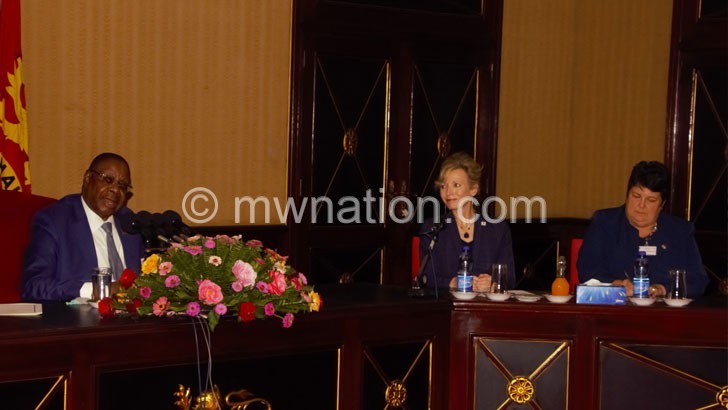MCC says new compact in 3 years
Malawians will have to wait for about three years before negotiations on the next Millennium Challenge Corporation (MCC) compact can be completed and implementation on the new project start.
Briefing journalists in Lilongwe yesterday, MCC vice-president Jeanne Hauch justified the apparent lengthy process of developing a new compact, saying it minimises project risks, among other factors.

She said: “Compact development typically takes two to three years of analysis and planning before a grant agreement can be signed.
“Commitment to this process helps minimise project risks, ensures input from all stakeholders, and sets up the future programme for success to benefit Malawi as a whole. Inclusive economic growth is durable growth.”
Malawi has since selected former Millennium Challenge Account-Malawi (MCA-M) chief executive officer Dye Mawindo as the national coordinator to complete jointly with MCC economists an analysis on constraints to economic growth.
It is that analysis which would determine the factors constraining growth and inform the identification of the project before feasibility studies are conducted.
Hauch added: “At the conclusion of the compact development process, Malawi will estimate the cost of project interventions and the team will propose an overall compact.”
The compact development process includes extensive consultations engaging potential beneficiaries, civil society, private sector, other donors and relevant government entities.
Hauch, who is also MCC’s general counsel and corporate secretary, said that next week her institution, a United States of America government agency, would assign a team of technical experts to start working with the new coordinator.
During the three-year period, Malawi would be required to work to control corruption and commit to good governance if it is to continue being eligible for a new compact.
In March 2012, MCC suspended Malawi’s energy compact after a series of poor governance decisions under the administration of former president Bingu wa Mutharika who, among other things, accused some donors of sponsoring demonstrations against his government.
Hauch said throughout the compact development process, every year Malawi will need to be re-selected as eligible to develop a compact.
She said: “This requires that Malawi continues to meet MCC’s eligibility criteria, including passing MCC’s scorecard, showing a clear commitment to good governance and sustaining the first compact’s investments.”
During the last MCC scorecard in 2018, Malawi was ranked at 65 percent on controlling corruption from 59 percent in 2017.
The high scorecard came at a time when perceptions were high that corruption had reached uncontrollable levels and involving high ranking government officials.
While MCC acting resident country director Karen Fadely said she was not able to state the reasons for Malawi’s good score despite the reports of corruption, the scorecard was a combination of third party indicators which the US government compiled to come up with the report.
In his remarks during the meeting with the MCC delegation at Kamuzu House, President Peter Mutharika said Malawi was looking forward to the second compact after the first energy compact unlocked Malawi’s potential for increased energy generation and transmission.
On his part, Minister of Finance, Economic Planning and Development Goodall Gondwe said that the team of experts that Malawi has assembled would do a great job in identifying a potential project.
In December last year, Malawi became eligible for a second compact after successfully completing the $350.5 million energy compact and maintaining a good score on indicators on good governance and corruption.





